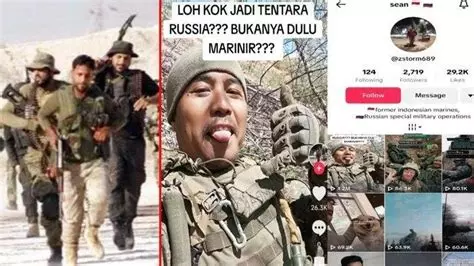The viral plea of an ex-marine who joined the Russian army and lost his Indonesian citizenship has ignited a storm at home, where geopolitical alignments, economic hardship, and national identity collide.
When Patriotism and Poverty Collide
In a TikTok video published on July 20, 2025, a uniformed man stares into the camera. “Due to my ignorance, I signed a contract with the Russian Ministry of Defense. This led to the revocation of my Indonesian citizenship,” says Satria Arta Kumbara, a former chief sergeant of the Indonesian Navy turned Russian infantryman in Ukraine. “I beg the Indonesian government to help terminate this contract and reinstate my rights as a citizen.”
The video has been viewed over a million times, and not just because of its emotional appeal. Kumbara, whose fall from national service to foreign enlistment has been public since early May, has become a political Rorschach test in Indonesia: for some, a desperate man driven by hardship; for others, a traitor in search of sympathy.
From Jakarta to the Frontlines of Ukraine
Kumbara’s journey, pieced together through TikTok posts and LinkedIn comments, reveals a trail of uncertainty, ambition, and perhaps desperation. After deserting the Indonesian Navy in June 2022 and being sentenced in 2023 to a year in prison and dishonorable discharge, he reemerged online as a security job-seeker in the Gulf. By early 2025, his posts placed him in Kuala Lumpur, then Qatar, and finally Oufa, the Bashkir capital in central Russia.
From there, it was Ichimbay, a nondescript industrial city about 150 kilometers south, where he reportedly signed a military contract with the Russian government. Russia, in dire need of manpower, has been actively recruiting foreigners since 2022, offering fast-track citizenship, legal anonymity, and a lucrative salary of up to €45,000 per year, nearly 15 times the average Indonesian military wage.

A Professional Soldier or Just a Hired Gun?
In interviews and posts, Kumbara insists he is not a mercenary. “I fight as part of the regular Russian army,” he told Republika in May 2025. He claims to serve alongside Chinese, Cameroonian, Ghanaian, and Colombian nationals.
But that argument may not shield him from legal consequences. Indonesian law strictly prohibits joining foreign armies without state approval, and the Ministry of Justice reaffirmed in May that this automatically strips one’s citizenship.
What Kumbara claims not to have known, however, is precisely what has now turned his case into a national controversy: “I never betrayed my country. I just wanted to earn a living.”
The Echo Chamber of TikTok Nationalism
If the state remains cautious, the public isn’t. Kumbara’s message has split Indonesian society. Military voices, legal experts, and media figures see a clear violation. But many ordinary citizens, particularly the working class and the disillusioned — perceive him as a victim of economic desperation and government neglect.
“Those who steal from the people are protected. Those who try to earn a living abroad are punished,” Kumbara declared in a now-deleted Facebook video, in which he accused authorities of corruption and hypocrisy.
Radityo Dharmaputra, a political analyst at Airlangga University, told RFI the story has struck a chord because of two overlapping crises: unemployment and distrust in the political elite. “His framing, that he left not to fight for Russia, but to survive — resonates in a country where job scarcity and institutional corruption are daily realities,” he said.
The Russian Soft Power Effect
Kumbara’s public support is also symptomatic of Indonesia’s ambiguous stance toward Russia. A Cold War legacy of Soviet-Indonesian cooperation, combined with widespread anti-Western sentiment and sympathy for Russia’s strongman image, has nurtured an undercurrent of informal alignment with Moscow. Vladimir Putin, seen as a bulwark against Western liberalism and a defender of multipolarity, enjoys significant popularity among conservative and nationalist circles.
The October 7 Gaza crisis, and Zelensky’s early pro-Israel stance, only further weakened Indonesia’s popular support for Ukraine, turning the Russian cause into a symbol of resistance for some.
Hedonism, Debt, and Doubt
But cracks are emerging in Kumbara’s narrative. Four days after the viral plea, Indonesia’s Marine Corps commander claimed Kumbara left for Russia due to spiraling debts, allegedly incurred to fund a “hedonistic lifestyle,” including gambling. While these claims remain unverified, they feed into growing skepticism, especially amid a crackdown on online gambling that has implicated hundreds across the archipelago.
His sudden wish to return, too, raises eyebrows. “Perhaps he didn’t get paid enough. Perhaps the situation on the front has worsened,” speculated Dharmaputra. Either way, his romanticized departure is quickly turning into a cautionary tale.
Jakarta’s Dilemma
The government, for now, remains ambivalent. The Navy has confirmed Kumbara is no longer affiliated. The Foreign Ministry says it continues to monitor his movements but refers all questions to the Justice Ministry, which reiterates that only a direct request to the President can restore his citizenship.
What is clear is this: the state does not want this precedent to become a trend. “We urge all citizens to exercise extreme caution before considering service in a foreign army,” the Defense Ministry stated. And yet, Kumbara’s videos remain online, where hundreds of comments ask for guidance on how to “join Russia too.”
The Face of a Fractured Allegiance
What began as a personal gamble is now a national quandary. Kumbara’s case lays bare the tensions between individual survival and national loyalty, between the allure of foreign adventure and the constraints of citizenship. In a volatile global moment, his story is not just about one man, but about what a nation values, and what it quietly ignores.



